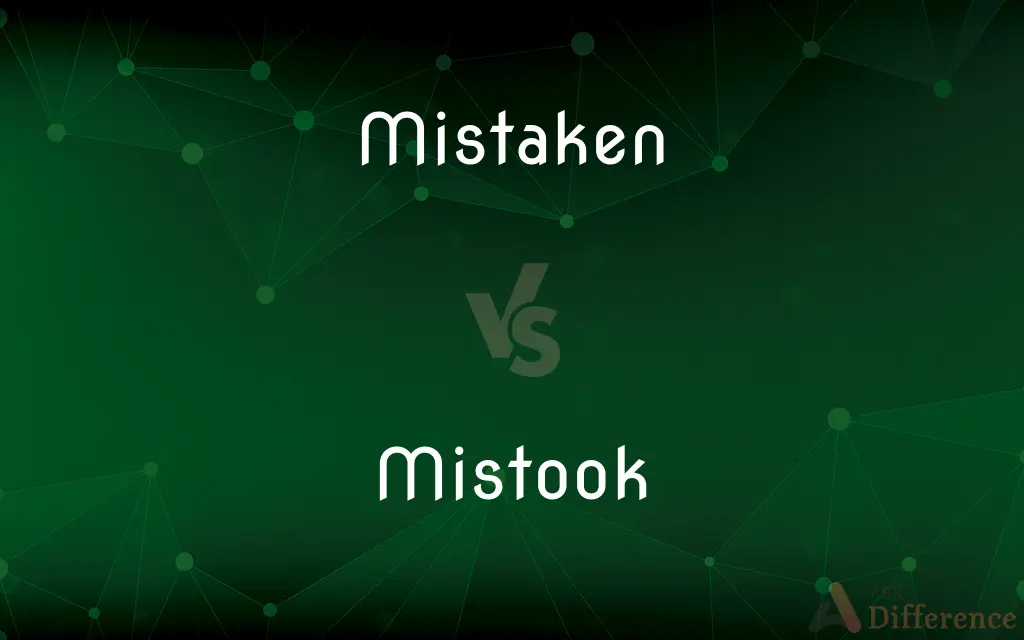Mistaken vs. Mistook — What's the Difference?
By Fiza Rafique & Urooj Arif — Updated on April 29, 2024
Mistaken is an adjective meaning incorrectly understood or identified, while mistook is the past tense of the verb 'mistake', used to indicate an action where something was wrongly perceived or recognized.

Difference Between Mistaken and Mistook
Table of Contents
ADVERTISEMENT
Key Differences
Mistaken generally describes a state of being wrong in understanding or identification. For example, if someone is mistaken, they have an incorrect perception or belief about something. On the other hand, mistook specifically refers to the action of misunderstanding or misidentifying something in the past. It implies that an error was made at a particular moment.
Mistaken is often used to describe ongoing or current states of misconception. It might apply to beliefs, identities, or facts that are wrongly interpreted. Whereas, mistook points to a specific instance in the past where an error occurred. This can involve actions like mistaking a person for someone else or a decision based on wrong information.
When using mistaken, it typically appears as part of a larger sentence structure, modifying nouns or functioning as a predicate adjective. For example, you might hear, "You are mistaken," or "These ideas are mistaken." Conversely, mistook, being a verb form, directly follows the subject and precedes an object, as in, "She mistook him for a waiter."
In speech and writing, mistaken may be paired with auxiliary verbs to form various tenses, thus serving to describe errors in different temporal contexts, though often in the present or general past. On the other hand, mistook is locked into its role as the simple past form of 'mistake', leaving its usage more limited to narratives or accounts of past events.
Mistaken can also appear in passive constructions, emphasizing the state or result of an error, such as in "I was mistaken" or "The instructions were mistaken." In contrast, mistook cannot be used passively since it is inherently an active past verb form, focusing on the subject's action in the past.
ADVERTISEMENT
Comparison Chart
Part of Speech
Adjective
Verb (past tense)
Usage Context
Describes a state
Describes an action
Temporal Context
Present/general
Past
Example Construction
"He is mistaken."
"He mistook her for someone else."
Passive Construction
Possible ("was mistaken")
Not possible
Compare with Definitions
Mistaken
Based on faulty understanding.
Their conclusion was mistaken due to incorrect data.
Mistook
Past tense of mistake, to identify wrongly.
He mistook sarcasm for sincerity.
Mistaken
Misinterpreted.
The gesture was mistaken as hostile.
Mistook
To misjudge or misunderstand someone or something in the past.
She mistook his intentions.
Mistaken
Erroneously held as a belief.
His assumption was mistaken, as the facts later showed.
Mistook
To select incorrectly as a choice or answer.
He mistook the wrong option on the test.
Mistaken
Incorrectly understood or identified.
She was mistaken about the time of the meeting.
Mistook
To confuse one thing for another.
I mistook the sugar for salt.
Mistaken
Wrong in opinion or judgment.
She was often mistaken in her estimates.
Mistook
To fail in recognizing correctly.
He mistook the stranger for his friend.
Mistaken
Past participle of mistake.
Mistook
Past tense of mistake.
Mistaken
Wrong or incorrect in opinion, understanding, or perception.
Mistaken
Based on error; wrong
A mistaken view of the situation.
Mistaken
Past participle of mistake
I'm frequently mistaken for my brother.
Mistaken
Erroneous.
A mistaken sense of loyalty.
Mistaken
Having an incorrect belief.
I think you must be mistaken.
He admitted he was mistaken about the budget numbers.
Mistaken
Being in error; judging wrongly; having a wrong opinion or a misconception; as, a mistaken man; he is mistaken.
Mistaken
Erroneous; wrong; as, a mistaken notion.
Mistaken
Wrong in e.g. opinion or judgment;
Well-meaning but misguided teachers
A mistaken belief
Mistaken identity
Mistaken
Arising from error;
A false assumption
A mistaken view of the situation
Common Curiosities
What does mistaken usually imply?
Mistaken typically implies a current or ongoing error in understanding or identification.
What is a common mistake in using mistaken and mistook?
A common mistake is using mistook as if it were an adjective or in the wrong tense, e.g., "I am mistook," which should be "I am mistaken" or "I mistook."
Is mistook only applicable to actions involving people?
No, mistook can refer to any misjudgment or misidentification, involving people, objects, or situations.
How do mistaken and mistook differ in terms of correction?
Mistaken can be ongoing and may still be correctable, whereas mistook refers to past actions that typically cannot be altered once done.
How is mistook used in a sentence?
Mistook is used to describe a past action where someone incorrectly perceived something, e.g., "She mistook him for the gardener."
What is the noun form of mistook?
The noun form for both mistaken and mistook is "mistake."
Can mistaken be used to describe future errors?
Yes, mistaken can be used to describe potential or hypothetical errors in the future, e.g., "You will be mistaken to assume that."
Can mistaken be used in formal writing?
Yes, mistaken is appropriate for both formal and informal contexts.
Does mistaken always indicate something negative?
Typically, yes, since it refers to incorrect or erroneous beliefs or identifications.
Can both mistaken and mistook be used interchangeably?
No, they serve different grammatical functions and contexts.
What is a tip for remembering the difference between mistaken and mistook?
Remember, mistaken is an adjective (describing a state), and mistook is the past tense of a verb (describing an action).
Can mistook be used in progressive tenses?
No, mistook is used in simple past tense constructions only.
Can mistook appear in present tense forms?
No, mistook is strictly the past tense; the present tense is "mistake."
Is there a perfect tense form of mistook?
Yes, the perfect tense would be "had mistaken."
How do mistaken and mistook compare in terms of frequency of use?
Mistaken is more commonly used because it is versatile and applicable in various grammatical structures.
Share Your Discovery

Previous Comparison
Inspirit vs. Inspire
Next Comparison
Yaourt vs. YogurtAuthor Spotlight
Written by
Fiza RafiqueFiza Rafique is a skilled content writer at AskDifference.com, where she meticulously refines and enhances written pieces. Drawing from her vast editorial expertise, Fiza ensures clarity, accuracy, and precision in every article. Passionate about language, she continually seeks to elevate the quality of content for readers worldwide.
Co-written by
Urooj ArifUrooj is a skilled content writer at Ask Difference, known for her exceptional ability to simplify complex topics into engaging and informative content. With a passion for research and a flair for clear, concise writing, she consistently delivers articles that resonate with our diverse audience.















































